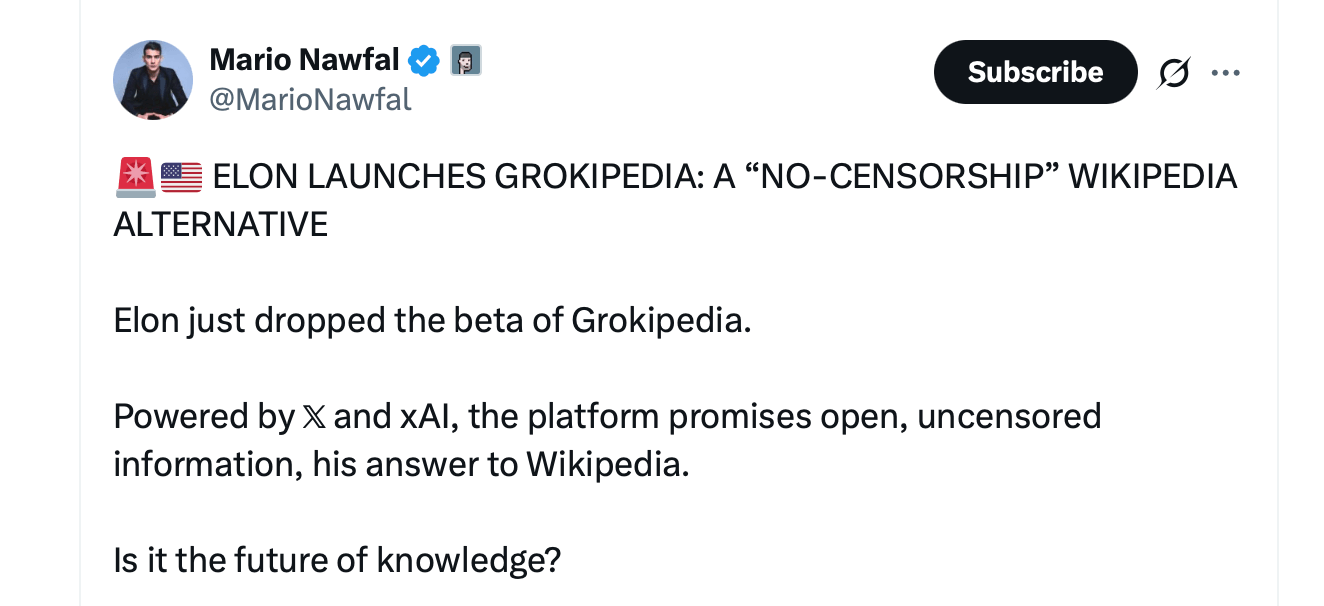Launched in early beta on Oct. 27, 2025, Grokipedia is Musk’s latest step toward what he calls “understanding the universe” — and possibly the only encyclopedia with cosmic ambition built right into its mission statement.
Branded as a “maximum truth-seeking” antidote to bias, the platform runs on Grok, xAI’s neural brainchild, which curates, rewrites, and updates content in real time. At launch, Grokipedia opened the digital doors with over 885,000 articles, each freshly minted by AI and open-source for the world to tinker with — no paywalls, no quotas, and a direct data line into X (formerly Twitter) for real-time updates.

This brainchild didn’t come out of nowhere. Musk has been side-eyeing Wikipedia for years, accusing it of “woke bias” and promising to do better. He teased the project on Oct. 5, vowing a release “in two weeks” and branding it a fortress of “unbiased information and facts.” A few delays later — after, in his words, a “propaganda purge” — Grokipedia’s version 0.1 dropped, accompanied by Musk’s usual mix of cosmic aspiration and internet mischief.
Under the hood, Grokipedia’s Grok model sorts data like a digital truth detective — labeling claims as true, partly true, false, or missing context, and rewriting content in seconds. Forget dusty archives: this thing updates as fast as the news cycle scrolls.
And it’s not shy about scale either. Grokipedia comes without usage limits, supports multiple languages, and lets users suggest edits — though AI plays the bouncer at the door. Musk insists it’s all part of building “a truly truthful AI,” because, as he puts it, “you can’t build a truthful system if the information it learns from is biased.”

Grokipedia’s article on Bitcoin.
Of course, not everyone’s ready to crown it the new oracle of truth. Critics warn that if Grok’s training data leans one way, the “maximum truth” machine could end up just as biased — only faster. Experts like Oxford’s Taha Yasseri and Northeastern’s Joseph Reagle note that while Musk’s critique of Wikipedia hits home, algorithmic opacity might be its own flavor of distortion.
Wikipedia still boasts more than 6.7 million English entries, but Grokipedia’s speed advantage is hard to ignore — what takes Wikipedia editors days, Grokipedia does in minutes. Fans on X are calling it “game over for Wikipedia,” while skeptics argue it’s more like “Wikipedia with attitude.”
Structurally, it’s also a different beast: Wikipedia runs on donations, Grokipedia runs on Musk. It’s free for now, but xAI could eventually cash in with premium tiers or integrations.
Still, early users are charmed — praising the clarity, context, and responsiveness. Whether it dethrones Wikipedia or just shakes the dust off the old encyclopedia model, Grokipedia is Musk’s boldest move yet in his ongoing war on bias — one edit at a time.
- What is Grokipedia?
Grokipedia is an AI-powered encyclopedia developed by xAI, launched on Oct. 27, 2025, to provide real-time, bias-reduced knowledge verified by the Grok AI model. - How is Grokipedia different from Wikipedia?
Unlike Wikipedia’s community-driven model, Grokipedia uses AI to generate and cross-check content instantly, integrating real-time data from X. - Is Grokipedia free to use?
Yes, Grokipedia is open-source and free with no paywalls or usage limits, though xAI may explore premium features in future updates. - Where can I access Grokipedia?
Visit grokipedia.com for the live beta version, which currently features more than 885,000 AI-curated articles.
免责声明:本文章仅代表作者个人观点,不代表本平台的立场和观点。本文章仅供信息分享,不构成对任何人的任何投资建议。用户与作者之间的任何争议,与本平台无关。如网页中刊载的文章或图片涉及侵权,请提供相关的权利证明和身份证明发送邮件到support@aicoin.com,本平台相关工作人员将会进行核查。




